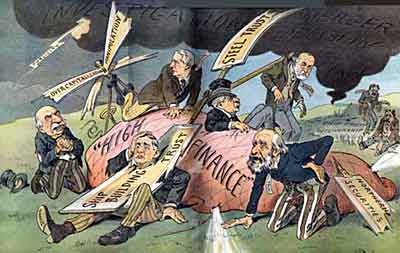A) Expansion of the role of President – Roosevelt had an activist bent that led him to try (largely successfully) to expand the role of the president. Chief executives since Lincoln had been rather weak administrators who were inclined to follow the lead of Congress. While TR was expanding the role of chief executive, however, he was expanding it for fundamentally conservative principles.
1) Trust busting – Roosevelt’s reputation as the “trust-buster” is largely undeserved—his successor, the lethargic William Howard Taft and his administration actually brought many more suits against trusts than did the Roosevelt administration. Roosevelt felt that monopolies were a logical consequence of capitalism; unlike many of his Progressive cohorts, he welcomed this development—as long as the government controlled these monopolies.
(a) Northern Securities Company – TR and his administration did pursue a case against the Northern Securities Company, which was a holding company for the Great Northern and Northern Pacific Railroads; railroads were largely unpopular still, and a strong case could be made that the railroads were in fact engaged in interstate commerce, a crucial factor when the case went to the Supreme Court.
(b) Swift & Company v. United States – government contended that meatpackers combined together to restrict competitive bidding for livestock to slaughter; Supreme Court issued ruling using the “stream of commerce” doctrine, which held that some manufacturing processes did indeed take place in interstate means, and therefore were liable to federal regulation under the Sherman Anti-Trust Act.
(c) Bureau of Corporations – most trust regulation was handled by the newly formed Bureau of Corporations. The Bureau was charged with gathering information about corporations, in order to help them from violating the law. Roosevelt was less interested in busting trusts than he was in regulating them. He divided trust into good trusts and bad trusts; the determination into which pigeonhole a trust fell into was completely arbitrary. The good trusts were those whose officers came to the White House and had dinner with the president, and who cooperated with the Bureau; bad trusts did not do these things.
(d) Interstate Commerce Commission (ICC) – although the ICC was established in 1887, it was little used until the Roosevelt administration. TR’s advocacy of regulation was resented by some businessmen (particularly Henry Clay Frick, who complained that “the son of a bitch” wouldn’t stay bought after many businessmen contributed heavily to his 1904 campaign); however, because these regulatory commissions tended to be staffed with officials from the industry the commission was charged to regulate. The Hepburn Act gave the ICC the right to set maximum freight rates, and it outlawed the payments of kickbacks to large volume shippers. Essentially what the ICC did was to allow the railroads to collude and set rail rates—something they had been trying to do for approximately thirty years anyway, and something farmers and workers had been working to prohibit for the same length of time.
(e) Meat Inspection Act and the Pure Food and Drug Act – Upton Sinclair published The Jungle in early 1906, a hard-hitting expose of working and living conditions in the packinghouses and their environs in Chicago. That part of the book received very little notice, however; as Sinclair himself described it, “I aimed for people’s hearts, and hit their stomachs.” His descriptions of sausage making (combining putrid meat, rat shit, the occasional part of an extremity from a worker, and a blend of original spices) stirred TR and Congress into action.





No comments:
Post a Comment